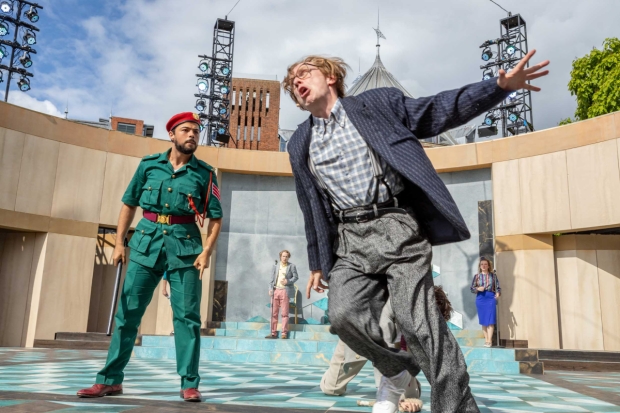The Comedy of Errors at the RSC's Garden Theatre – review
The RSC goes outdoors as it welcomes audiences once more

© RSC / Pete Le May 2021
It really needed to be something bold and brash to kickstart the Royal Shakespeare Company's return from lockdown – and who better than physical comedy master director Phillip Breen to deliver? With an enviable RSC track record and a deft hand with the farcical, he serves up a treat of a summer pudding in a delight of a new venue.
Built in large part courtesy of a substantial donation by billionaire philanthropist Manfred Gorvy and his wife Lydia – whose names have been bestowed upon the Garden Theatre – the open-air amphitheatre is a stunning temporary addition to the RSC's estate on the banks of the Avon in Stratford. The stage nestles in the lee of the Swan Theatre and the setting sun drenches half the auditorium in a warm glow until it sinks behind the bleachers. Take sunglasses if you're planning to be in those seats.
The choice of play may be less than crowd-pleasing: an early work which hams up the farce and comes perilously close to doggerel in much of its verse. But instead of trying to gloss over its ludicrous imperfections and pretend this is somehow up there with the true greats of the canon, Breen and his multi-talented company grab it with gusto and wring every last laugh from every possible verbal, visual and physical gag.
The result is less than subtle, but if farce is your thing, it's beautifully handled. The performances are well-matched and it has the feel of a genuine ensemble as it tumbles, crashes, gurns and yells through the increasingly implausible plot twists and identity misunderstandings. Guy Lewis and Rowan Polonski invoke the spirit of Rik Mayall as the Antipholus twins, separated as babies and causing mayhem in each other's stead. Jonathan Broadbent and Greg Haiste make perfect foils as their respective manservants Dromio.
Across the cast, there are touches of brilliance and moments of high comedy, with Breen's directorial hand steering proceedings assuredly to their outrageous conclusion. But equal credit must go to the rest of the creative team: Max Jones's modern design, set in the contemporary Middle East, conscripts elements such as refugeeism, ostentation and barbaric punishments with a delicate sensibility, never overloading the resonances but making them integral to the production.
Paddy Cunneen's extraordinary score, sung in crystal clear, deliberately dissonant four-part harmony by the unaccompanied on-stage chorus of Alex Saunders, Dunja Botic, Dale Harris and David Jones, is sheer genius. It's unsettling, complementary, weird and utterly absorbing: the icing on that tasty summer pudding.













